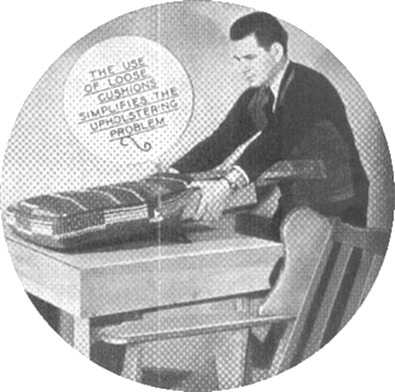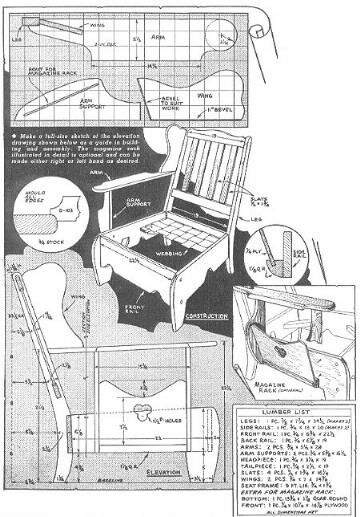|
|
|
The Woodcrafter Page© 2004 - all rights reserved.
|
|
|
|
A Bannister Back
Colonial WING CHAIR
Here is the original article straight
from
Book No. 4502, PRACTICAL DELTA PROJECTS
NEW & NOVEL THINGS TO MAKE,
BOOK 2
DELTA MFG. DIVISION
Simple
Design in Solid Stock Requires
Only Band Sawing
and Shaping
| A
COLONIAL chair in maple
makes a satisfying
project, being easy to
build and offering no
great problem in
upholstering. A chair of
this type combines well
with conventional two
piece overstuffed living
room suites and also
makes an attractive
bedroom chair. Start work
by making a rough
full-size plan of the
elevation, as shown in
the drawing. This will
give the leg shape and
serve as a guide in
taking off the bevels at
the arms and arm
supports. The legs are
next traced from the
full-size plan, using
carbon paper. The wood
listed in the material
list is of such a size as
to permit both legs being
cut from one piece.
Similarly, one piece, if
obtainable in the width
specified, can be used to
cut both side |
|
 |
|
 |
rails with a minimum amount
of waste. Another good form of
rail construction would be to use
a glue joint at the point where
the rail extends to make the
front leg. Long dowels at the
joint would have the advantage of
stiffening the cross grain in the
legs. The length dimension of the
rails in the lumber list is net,
with no allowance made for
tenons. Therefore, if
mortise-tenon construction is
used at this point instead of
dowels, a suitable allowance in
the length of the rough lumber
should be figured. Other details
in the construction should be
apparent from the drawings. All
edges should be softened by using
D-103 shaper cutter or similar
shape. The arms should be sanded
to a slightly longer round on the
upper outside edges. The magazine
rack is optional and can also be
made either right or left hand as
desired. An 11 degree bevel is
necessary on the wings along the
edge that fits against the rear
legs. A bevel will also be
required on the edge which fits
against the arm. The exact angle
here is best determined directly
from the work. |
|
| Upholstering takes the
form of two loose cushions, both inner
spring construction although a down or
cotton filled pillow or pad could be used
for the back cushion. Inner spring
cushions can be ordered from any
upholsterer if you do not care for this
part of the work. However, the job is not
at all difficult and requires only a
spring mat, which is then covered with
two layers of cotton batting and slipped
into the casing. The cushion is supported
by means of a wood frame covered with
webbing. This, in turn is supported by
corner blocks screwed to the seat frame,
as can be seen in the drawing. The chair
should be finished as Ruddy Maple. After
the stain application, the piece can be
finished with varnish, shellac or lacquer
as desired. |
 |
* * * Click on any
picture above to download the original/complete
article in Adobe Acrobat format (pdf). * * *

|
*********** WARNING***********
Read my page on safety
before building this item.
|




